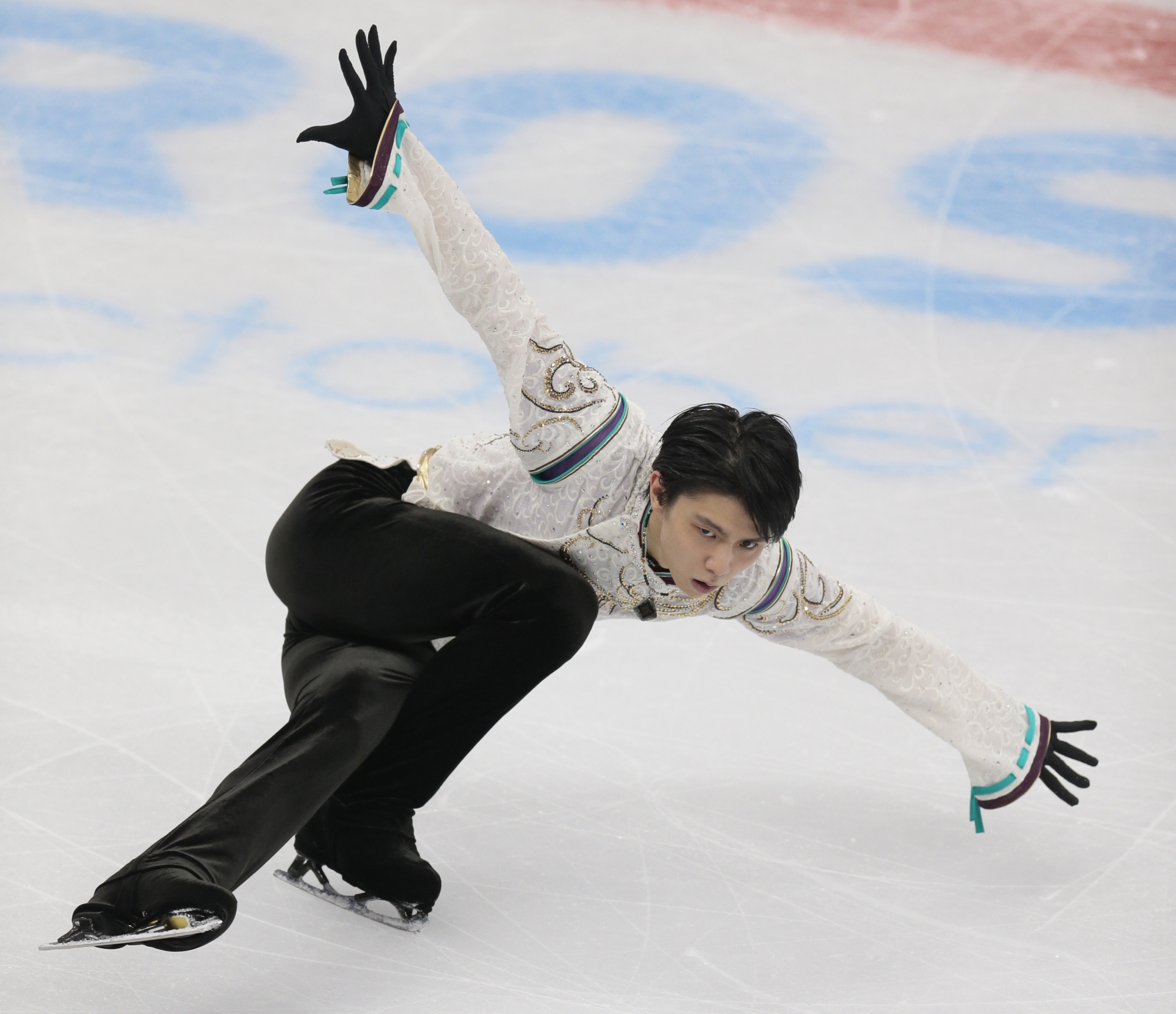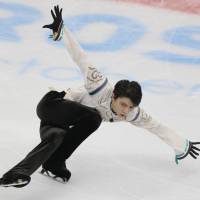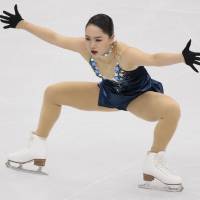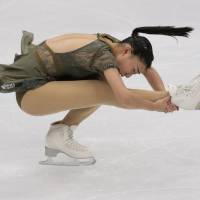Yuzuru Hanyu is continuing to build momentum in his run toward a second straight Olympic gold medal.
Hanyu began his Grand Prix season with a second-place finish at the Cup of Russia on Saturday, but his free skate was much improved from his showing at the Autumn Classic International last month in Montreal.
American Nathan Chen scored a narrow victory over Hanyu in Moscow, edging the world champion by just over three points (293.79 to 290.77) for the title. Russia's Mikhail Kolyada (271.06) was third.
Hanyu's streak of not winning his opening GP continued for an eighth season. At this point, winning or coming in second is almost irrelevant, however. It's all about continuing to progress and trying to peak for the Pyeongchang Olympics in February. That is the goal for Hanyu.
Hanyu under-rotated his opening quadruple loop and then fell on his quad toe loop/triple toe loop combination jump in his short program to Chopin's Ballade No. 1 and trailed Chen by nearly six points going into the free skate.
So high are the expectations now for Hanyu, that it's almost a disappointment for his fans when he doesn't win or set a world record.
Eurosport announcer Simon Reed relayed this message after the short program.
"Yuzuru is not infallible," Reed stated. "Sometimes he's perfect. It wasn't one of those days."
Reed's partner on the telecast, analyst Mark Hanretty, noted that Hanyu's use of previous programs has raised some eyebrows.
"He's used this program before and there has been a little bit of controversy over the fact that he has reverted back to it," Hanretty noted. "Some say that shows some sign of perhaps weakness or insecurity. But I think Yuzuru knows that this is such a beautiful piece of music and it is so well suited to him and it is very judge friendly this kind of style. Very different to the short program style that he used to win the Olympic Games in Sochi."
Once again, even in defeat, Hanyu's class was recognized by those commentating on the event.
"Even when he makes mistakes, his quality is so high on the other elements it keeps him in the conversation," said former U.S. champion Ryan Bradley on the Olympic Channel broadcast.
Hanyu's triple axel in the short program was sublime as usual.
"Beautiful triple axel within the choreography," noted Bradley. "Just seamless."
When Hanyu fell on the combination, Bradley was as surprised as anyone.
"Doesn't get the lift on the second jump," Bradley stated. "Can't hang on. Very uncharacteristic mistake for Yuzuru."
Bradley's broadcasting partner Andrea Joyce said Hanyu is not invincible.
"Despite all of his impressive results, he still does struggle at times with inconsistency," Joyce commented. "On a good day it seems like he is unbeatable, vulnerable on others."
Hanyu earned the top score for his free skate to "Seimei" and drew more rave reviews, even it it was not enough to lift him to victory. Bradley was profuse in his praise as Hanyu landed three quads, including a quad lutz for the first time in competition, and five triples.
"So incredible to me to see the potential in this free skate," Bradley stated. "This program, specifically in the second half, is so action-packed. That second quad toe, triple axel, triple axel, those happened in about a 25-second span, where he is seemingly just going from one jump straight into the next, straight into the next, really wrapping up that technical score.
"With that level of musicality, he is unmatched by anyone else in his discipline," added Bradley.
Hanretty had an interesting take on Hanyu's free skate.
"The last minute I thought was brilliant," Hanretty said. "He has something that's both a blessing and a curse. He has a really great knee action, which makes everything look very easy. But part way through the program it looked almost casual.
"Shoma Uno, who we will see next week at Skate Canada, his program is so jam-packed with content that it looks much more intense throughout. It will be interesting to see how the judges' component scores will reflect that."
Hanretty then pointed out the gravitas that Hanyu has because of his track record.
"Yuzuru, as an Olympic champion, he is considered to be a 9 out of 10 at least component skater. Whereas, Shoma doesn't have that Olympic title behind him to help him."
The mention of Uno was telling, as Ice Time has noted in recent months that while many are focusing on Chen as Hanyu's prime challenger for the gold in Pyeongchang, there are some who believe the real threat will come from Uno.
Ice Time felt this when he recently spoke with Dick Button and there are other analysts who share that sentiment.
CBC's Carol Lane, one of the top analysts in the sport, was clearly moved by Hanyu's free skate and identified some of the reasons why he is still assimilating it.
"He doesn't skate this program, he lives it," Lane commented. "He's invested in every movement. Every thing he does has intention and purpose. That's what makes it such a dynamic vehicle for him.
"In repeating the same program, he's not necessarily repeating the same elements in the same order. The pacing and the timing may have changed, and he has to get used to that."
Four-time world champion Kurt Browning believes there is something special not yet realized in Hanyu's free skate.
"The magic of this program didn't show up today," said Browning, on the CBC telecast. "It's early in the season. Was it because he doesn't feel like the same person as he did back then? Or is it just one of those nights when you have to work for things? Time will tell."
Hanyu still has some rough edges to smooth out and he recognizes it.
"The most important thing is for me to rotate each jump, each combination," Hanyu was quoted as saying by the ISU website. "That made the three points difference. I realized once again how important it is to practice each element and to perform each element with care."
Higuchi serves notice
Wakaba Higuchi took home the bronze medal in the women's event behind two-time Russian world champion Evgenia Medvedeva and Italy's Carolina Kostner.
Medvedeva won with 231.21, with Kostner on 215.98 and Higuchi at 207.17.
Higuchi looked stunning in a dark blue sequined outfit and her full arsenal of skills was on display and noted by observers following her free skate to "Skyfall."
"There was something special about her," stated Reed. "There is someone who looks like she could be a major contender for an Olympic medal."
Hanretty cited Higuchi's transitions for their excellence.
"I was so impressed with the transitional content that she had," Hanretty said. "She had such variation in the transitions that she used and difficulty in content."
Three-time U.S. champion Johnny Weir highlighted Higuchi's determination in her free skate.
"Japanese ladies aren't known for wearing their heart on their sleeves during performances," Weir commented on NBC's telecast. "But Wakaba has this inner fire that she had last year for her free program. This is a whole new level for her. Very mature."
Bradley recognized Higuchi's dynamism in his analysis following her free skate where she landed six triples.
"She is one of the most complete skaters in the world. A powerhouse," Bradley stated. "I love this program. So well packaged this season. If she can piece together programs like this all year long, she could very well see herself in South Korea."
Sakamoto settles for fifth
Kaori Sakamoto (194.00) came in fifth in her senior GP debut. She was fourth after the short program but slipped to fifth in part due to her fall on her planned opening triple flip/triple toe loop combo in the free skate to "Amelie."
Reed cited Sakamoto's fortitude in forging ahead after the early mistake.
"That was a performance of real character," Reed said. "A really destabilizing start. She really pulled it back together in the second half of the program."
Bradley felt the same way and said so.
"Great recovery. Having the forethought to get the triple/triple in the second half," Bradley commented. "Getting all three combos. Very smart ice skating."
Bradley mentioned Sakamoto's jumping prowess on her triple flip/triple toe loop combo in her short program to "Moonlight Sonata."
"Beautiful. So powerful that spring off the ice," Bradley said. "Jumping with utter ease."
JGP schedule set for 2018-19
The ISU announced the Junior Grand Prix schedule for next season on Friday. Ice Time is sorry to report that Japan will not be on the docket for the seven-event circuit.
The campaign will kick off in Bratislava, Slovakia (Aug. 22-25), then move on to Linz, Austria (Aug. 29-Sept. 1), Kaunas, Lithuania (Sept. 5-8), Harbin, China (Sept. 19-22), Ostrava, Czech Republic (Sept. 26-29), Ljubljana, Slovenia (Oct. 3-6) and Yerevan, Armenia (Oct. 10-13).
The decision to leave Japan off the JGP tour is a bit of a head-scratcher. Based on the current dynamic in skating and the interest level here, I think Japan should be hosting a JGP every season and also occasionally the world junior championships.
The JGPs in other countries are usually sparsely attended even though admission is often free. When Yokohama hosted a JGP last season, the Shin-Yokohama Skate Center was sold out each day.
With the JGP series being streamed live on the Internet, you would think that the ISU would want a full house on hand as often as possible. Ice Time is going to explore this issue some more and see if we can get to the bottom of it.




















With your current subscription plan you can comment on stories. However, before writing your first comment, please create a display name in the Profile section of your subscriber account page.